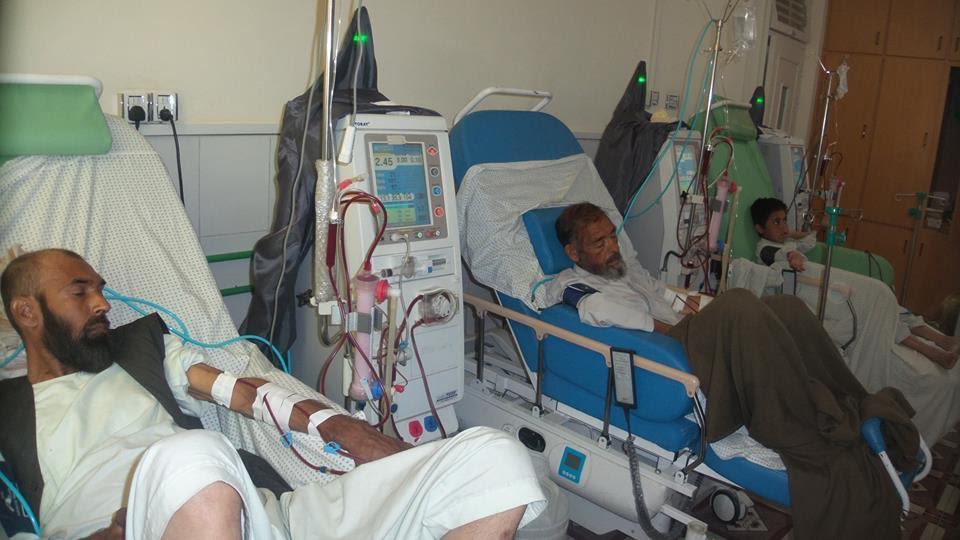LASHKARGAH (Pajhwok): Eighty percent of residents of southern Helmand province visit hospitals in other provinces or travel abroad for medical treatment due to insufficient facilities there.
Helmand is one of the war-torn provinces and most of its residents suffer from problems including lack of access to health services.
Public Health Director Mauladad Tobagar told Pajhwok Afghan News the health sector of Helmand was paid less attention considering the growing medical problems in the restive problems.
The Ministry of Public Health (MoPH) provided medicine for only one million people of Helmand while the real size of population was around three million, he claimed. Up to 700 patients visit Bust Hospital every 24 hours.
“We perform 18 operations on a daily basis at Bust Hospital. Unfortunately, we don’t have a well-equipped operation theatre in this hospital,” he lamented.
Many unprofessional people had been employed in the health sector due to interference by some individuals, he alleged. However, he did not name the individuals but said: “All of them are powerful figures.”
The Import of poor-quality drugss by some traders to the province has created more problems for the people, another big issue that must he addressed on priority, he stressed.
Tobagar said some personnel were given high salaries by donors without consultation with his department. Such employees are unwilling to work in districts and instead stayed in Lashkargah, the provincial capital.
Considering the existing problems, 80 percent of Helmand residents went to other provinces or travelled abroad for medical treatments, he said. “Barring people with seasonal diseases, all other patients are referred elsewhere due to problems in Helmand,” he argued.
He has shared the problem with MoPH for solution, with the ministry having promised corrective steps.
Helmand Civil Hospital Director Dr. Nisar Ahmad Barak acknowledged the health sector in the province was marred by brazen interference.
“Besides meddling in our affairs, they allocate us limited funds. The number of personnel is also insufficient, but even then they don’t receive salaries in time.
“Some of our gardeners and others are taken out of here while we don’t know where they work,” he charged, saying support from the Doctors Without Borders helped resolve their problems.
Currently the Helmand Civil Hospital has 900 staff members, including 161 from MoPH and the rest from MSF, he explained. The hospital has 400 beds but 500 people with seasonal diseases visit it daily.
To Asked why some people visited other provinces and foreign countries for medical treatment, he replied: “Yes, some patients who could not be treated here go to other areas and abroad.”
Barak continued otology, otorhinolaryngology and dental sections of the crowded hospital were still inactive.
Mullah Baran, hailing from the Dasht area of Nad Ali district, claimed local doctors could not treat his mother’s stomach disorder. “I have spent 100,000 afghanis, visited different clinics — private and government — but my mother’s health remains precarious.”
Baran finally took his mother to a hospital in Quetta, the capital of Pakistan‘s southwestern Balochistan province. Within few days, his mother regained her health. She has never complained again of stomach problems.
Ezzatullah, who belongs to Lashkargah’s Babage area, was diagnosed with malaria. which later degenerated into typhus.
“I visited every doctor in Helman but no one gave me medicine that could improve my health. Finally, I went to Kabul where doctors hospitalised me and I recovered,” he recalled.
Gul Khan, a visitor to Helmand’s Bost Hospital, said the facilities for treating all sick people were far from adequate. “My child has been admitted, but there is no place for attendants. My wife has to stay with the child.”
Mullah Atiqullah, a resident of Musa Kala, said most of doctors in Helman were non-professional and inexperienced. “My father has been hospitalised for three days his health is yet to improve.”
Atiqullah added he had been looking for other options and intended to transfer his father to another province for medical treatment.
A individual in the Public Health Department said on condition of anonymity that most of the individuals in the Vaccination Section had been hired on the basis of nepotism, not qualifications.
Some workers have been registered and regularly receive salaries — a clear something amounting to corruption. In this way, vaccination drives could not be successfully implemented in Helmand, where positive cases occasionally surface.
Helmand’s Baghran, Dishu, Musa Kala, Nawzad, Khanshin and Sangin districts and parts of Lashkargah have been under Taliban‘s control. The government holds some areas of Nad Ali, Washer, Marja, Nawa, Gramseer and Greshk district.
mds/nh/mud








GET IN TOUCH
NEWSLETTER
SUGGEST A STORY
PAJHWOK MOBILE APP